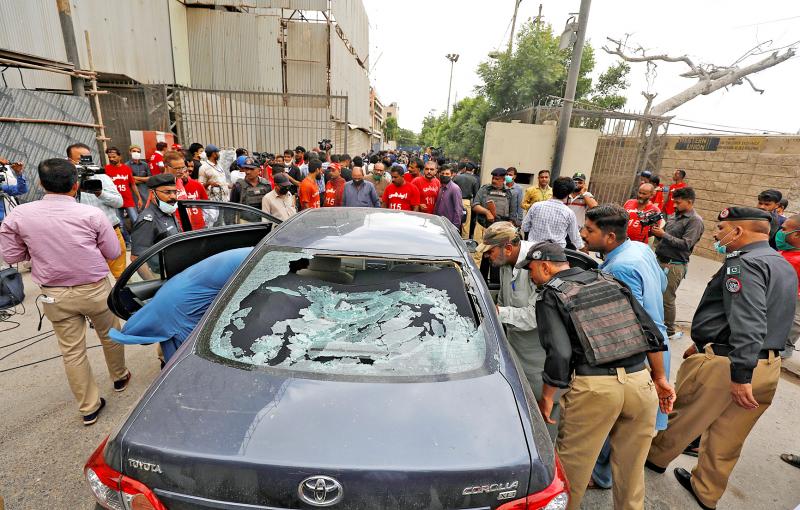Militants yesterday attacked the stock exchange in the Pakistani city of Karachi, killing at least six people — four security guards, a policeman and a bystander, police said.
Special police forces deployed to the scene of the attack and in a swift operation secured the building.
Local police chief Ghulam Nabi Memon confirmed that all four attackers were also dead.

Photo: Reuters
The Baluchistan Liberation Army (BLA), ethnic Baloch separatists, claimed responsibility for the attack. Over the past few years, the group has hit a string of high-profile targets across the country, including in the southern port city of Karachi.
The attackers were armed with grenades and automatic rifles, and launched the attack by opening fire at the entrance gate of the Pakistan Stock Exchange, the police said.
Heavily armed special forces quickly surrounded the building, located in the heart of Karachi’s financial district, where the Pakistan State Bank is located, as well as the headquarters of several national and international financial institutions.
Local television stations broadcast images of police in full body armor surrounding the building, but still staying outside the high-walled compound of the stock exchange.
Rizwan Ahmend, a police official at the scene, said that after opening fire, the gunmen entered the stock exchange grounds.
He said that after the attack was over, police found food supplies on the bodies of the gunmen, indicating they might have planned a long siege, which police quickly thwarted.
Inside the stock exchange, broker Yaqub Memon said that he and others were huddled inside their offices while the attack was underway.
As the firing ended and the gunmen were killed, police gathered all the employees and brokers in a single room, while security forces went floor by floor to ensure that no explosives had been left behind, he said.
Police spokesman Shazia Jehan said that the police called the bomb disposal team to the stock exchange to clear the building of any explosive devises.
The BLA is one of several insurgent groups fighting primarily in Pakistan’s southwestern Balochistan Province, which has been rocked by separatist, Islamist and sectarian violence for years.
The group in the past few years has targeted infrastructure projects along with Chinese workers in Pakistan multiple times, including during a brazen daylight attack on the Chinese consulate in Karachi, which killed four people in 2018.
In May last year, the BLA attacked a luxury hotel near the Afghan border at Gwadar, where a port development is the flagship project of a China-funded multibillion-dollar national infrastructure project.
The group yesterday circulated to the media a photograph of four men in full body armor and camouflage outfits, saying they were the militants who attacked the stock exchange.
The Karachi stock exchange is Pakistan’s largest and oldest stock exchange, incorporated today with the exchanges in Islamabad and Lahore.
Additional reporting by AFP

Yemen’s separatist leader has vowed to keep working for an independent state in the country’s south, in his first social media post since he disappeared earlier this month after his group briefly seized swathes of territory. Aidarous al-Zubaidi’s United Arab Emirates (UAE)-backed Southern Transitional Council (STC) forces last month captured two Yemeni provinces in an offensive that was rolled back by Saudi strikes and Riyadh’s allied forces on the ground. Al-Zubaidi then disappeared after he failed to board a flight to Riyadh for talks earlier this month, with Saudi Arabia accusing him of fleeing to Abu Dhabi, while supporters insisted he was

‘SHOCK TACTIC’: The dismissal of Yang mirrors past cases such as Jang Song-thaek, Kim’s uncle, who was executed after being accused of plotting to overthrow his nephew North Korean leader Kim Jong-un has fired his vice premier, compared him to a goat and railed against “incompetent” officials, state media reported yesterday, in a rare and very public broadside against apparatchiks at the opening of a critical factory. Vice Premier Yang Sung-ho was sacked “on the spot,” the state-run Korean Central News Agency said, in a speech in which Kim attacked “irresponsible, rude and incompetent leading officials.” “Please, comrade vice premier, resign by yourself when you can do it on your own before it is too late,” Kim reportedly said. “He is ineligible for an important duty. Put simply, it was

The Chinese Embassy in Manila yesterday said it has filed a diplomatic protest against a Philippine Coast Guard spokesman over a social media post that included cartoonish images of Chinese President Xi Jinping (習近平). Philippine Coast Guard spokesman Jay Tarriela and an embassy official had been trading barbs since last week over issues concerning the disputed South China Sea. The crucial waterway, which Beijing claims historic rights to despite an international ruling that its assertion has no legal basis, has been the site of repeated clashes between Chinese and Philippine vessels. Tarriela’s Facebook post on Wednesday included a photo of him giving a

Syrian President Ahmed al-Sharaa on Sunday announced a deal with the chief of Kurdish-led forces that includes a ceasefire, after government troops advanced across Kurdish-held areas of the country’s north and east. Syrian Kurdish leader Mazloum Abdi said he had agreed to the deal to avoid a broader war. He made the decision after deadly clashes in the Syrian city of Raqa on Sunday between Kurdish-led forces and local fighters loyal to Damascus, and fighting this month between the Kurds and government forces. The agreement would also see the Kurdish administration and forces integrate into the state after months of stalled negotiations on